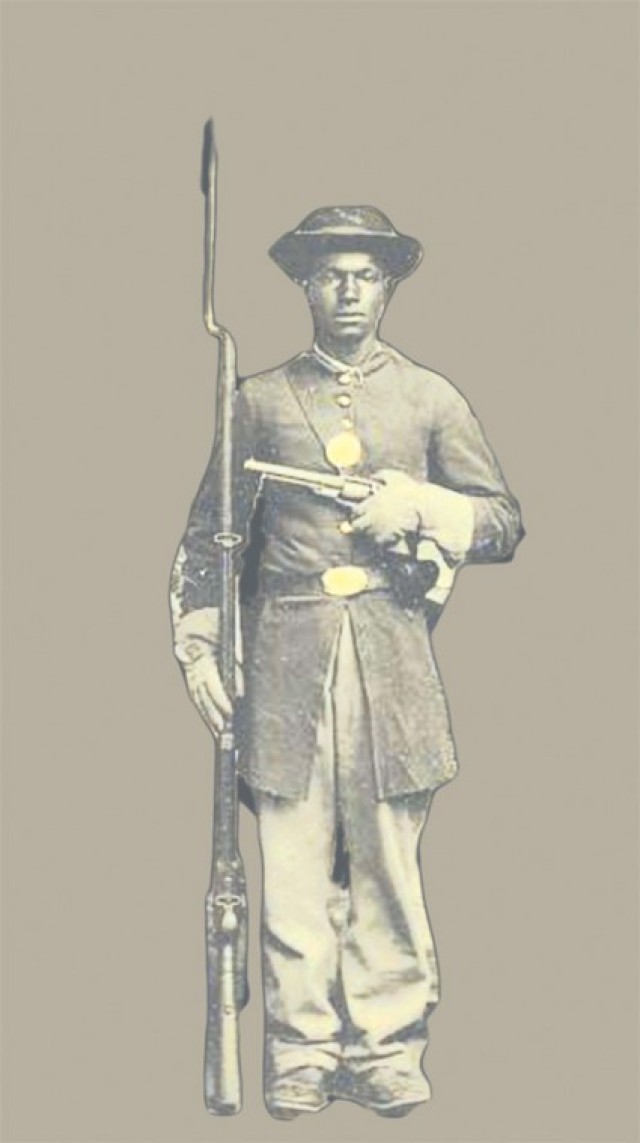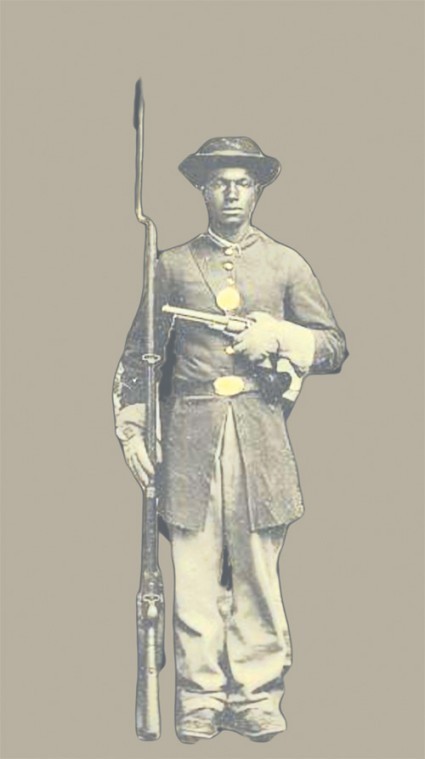FORT LEE, Va. (Feb. 10, 2010) -A corporal with a mutilated left arm fights on with his right and refuses to leave the battlefield.
A volunteer unit, demanding equal recognition, refuses its wages and nevertheless fights gallantly.
A sergeant, deeming it imperative to risk his life, rescues the colors from a wounded standard bearer, despite being wounded numerous times himself.
All are examples of the noble and courageous actions black soldiers and their units carried out in support of the Union's cause during the Civil War - the most divisive, deadly and epic event ever to have occurred on American soil, and in many ways, the only one in which blacks fought for the right to fight for their own freedom.
"This war bought us to a point where we could either be true to ideas of the founders or we could simply be a nation that was consumed by its faults, by its hypocrisy," said Hari Jones, curator, African American Civil War Memorial and Museum, Washington, D.C. "The Union victory in this war and the way it was won was closer to the ideals that reflected the best side of our America versus the worst; one in which we could hold another man as property for profit."
The Civil War - also called the War Between the States, Freedom's War (by many blacks) and the War of Northern Aggression (by many Southerners) - was a pivotal event that pitted the United States (the North) against the Confederate States (the South) over issues such as state's rights and slavery. While specific reasons for the war have been debated since the war ended, the result was indisputable: it preserved the Union and abolished slavery.
The business of slavery had existed 242 years prior to the start of the war. Although blacks had served and fought in every major conflict over that time period - as slaves and free men - their participation was often the result of necessity. But this war presented a rare opportunity, one in which they were the central issue and one in which they, if summoned to take up arms, could play a central role in validating their humanity and exonerate them from two centuries of bondage, injustice and unequal treatment.
The fervor blacks felt about the prospect of participating in the fight for their own freedom might be best illustrated by the eloquence of Alfred M. Green in a Philadelphia speech one month prior to the start of the war. In it, he urged blacks to take a stand despite their bottom-rung status as citizens:
"The time has arrived in the history of the great republic when we may again give evidence of being a world of bravery and patriotism and of a race in whose hearts burns the love of country, of freedom, and of civil and religious toleration. It is these grand principles that enable men, however proscribed, when possessed of true patriotism, to say, 'My county, right or wrong, I love thee still!'"
Many northern blacks - free and slave - shared Green's view but many whites didn't. Some questioned why they were fighting for the rights of blacks and many balked at arming them. In fact, at the start of hostilities - the attack on Fort Sumter, S.C., April 12, 1861 - the Union had no plans to officially include blacks in the war.
But the tribulation of war, as history would have it, often makes partners of the unlikeliest parties. President Abraham Lincoln, who didn't make the abolishment of slavery an objective of the war, was awakened to the need for more soldiers after a number of crushing defeats and pressure to recruit blacks by the citizenry of the north, abolitionists and field commanders, some of whom had already employed blacks in the war effort. The president began deliberations to put blacks in the ranks of the military sometime in the summer of 1862. In the following statement to New York Tribune Editor Horace Greeley, he seemed to indicate that the freedom of blacks in the south, and their subsequent inclusion in the military, was a measure to save the Union.
"...What I do about slavery and the colored race, I do because I believe it helps save the Union; and what I forbear, I forbear because I do not believe it would help save the Union," wrote Lincoln.
On Jan. 1, 1863, Lincoln made effective his Emancipation Proclamation. The decision immediately freed some slaves but not the vast majority of the 3 million held in the south and the border states. It did, however, make each succeeding northern battlefield effort a liberation campaign. Whatever the political implications, it was a decision that prompted widespread jubilation amongst blacks everywhere and flung open the doors of legalized military service for them.
The U.S. Colored Troops were formed in the spring of 1863 to usher in the free blacks, runaways and freed slaves who would join the ranks. More than 180,000 blacks answered the call for service in the USCT and more than 29,000 served in the Navy.
Dr. E. Curtis Alexander, a Chesapeake history educator and USCT re-enactor whose relatives served in the war, said a black man donning military attire for first time clearly understood what the war held for him.
"He was wearing a uniform of acceptance and expectation," he said. "He understood that."
Black soldiers, brimming with pride and purpose but also burdened with the hopes of their race, fought with bountiful urgency and wiped away any previous misconceptions about their bravery. Both Confederate and Union soldiers could attest to their mettle in battle.
"No troops can be more determined or more daring," said Union Maj. Gen. Nathaniel Banks in reference the 1st and 2nd Regiments of the Louisiana Native Guards during the Siege of Port Hudson (La.) that took place in the late spring and early summer of 1863. "They made, during the day, three charges upon the batteries of the enemy, suffering very heavy losses, and holding their position until nightfall with the other troops...
"Whatever doubt may have existed before as to the efficiency of organizations of this character, the history of this day proves conclusively that those who were in condition to prove the conduct of these new regiments that the government will find in this class of troops effective supporters and defenders."
Another black unit, the 54th Massachusetts Volunteer Infantry, made a name for itself at the Confederate Fort Wagner (S.C.) July 18, 1863. Its mission was to attack the installation that was protected by a wall and bounded by a deep marsh. When the charge was executed, a fiercely intense battle ensued, but the enemy did not yield. The 54th's commander was killed and so were 29 of his men. Twenty-four more died of their wounds, 15 were captured and 52 were never found. Members of the 54th had steadfastly refused their pay of $7 a month (compared to $13 for white soldiers) because of the obvious, but more importantly, they didn't want their service to be trivialized, said Jones.
Blacks not only passed the tests of battle as units but as individuals as well. Corporal Miles James, Company B, 36th Regiment, USCT and a native of Princess Anne County (now Virginia Beach), suffered a paralyzing wound on the battlefield at Henrico County's Chaffin's Farm Sept. 30, 1864. His arm was essentially amputated, yet he continued to fight. His Medal of Honor citation reads:
"Having had his arm mutilated, making immediate amputation necessary, he loaded and discharged his piece with one hand and urged his men forward; this within 30 yards (27 m) of the enemy's works."
James was one of 14 black soldiers to earn the Medal of Honor at Chaffin's Farm and Newmarket Heights.
Perhaps the most the most symbolic acts of bravery by a black soldier occurred at Fort Wagner July 18, 1863. Sgt. William H. Carney a member of the 54th and a runaway slave who was born in Norfolk, saved the American flag from falling to ground during an assault then planted it on a low wall protecting the fort even though he was wounded. When the assault was repulsed, he once again secured the standard during the retreat, despite suffering two more wounds.
Carney earned the Medal of Honor for his actions, one of 25 awarded to black soldiers during the war.
By the time the war ended in 1865, more than 620,000 people had died. More than 36,000 blacks are included in that number. Their participation was a determining factor in the war's outcome. And although their sacrifices didn't guarantee black people total freedom, it was the most the critical contribution toward that aspiration.
That aspiration maybe be best exemplified by Carney's figurative deed on the battlefield - someone who liberated himself from slavery, volunteered to fight for his cause and that of his country; one who refused to invest his heart in the war without the respect and dignity afforded any fighting man; but more importantly, one who invested his blood as an American Soldier and assured the Union's victory, the country's survival and his people a prideful, gallant walk down the path toward justice and equality.


Social Sharing